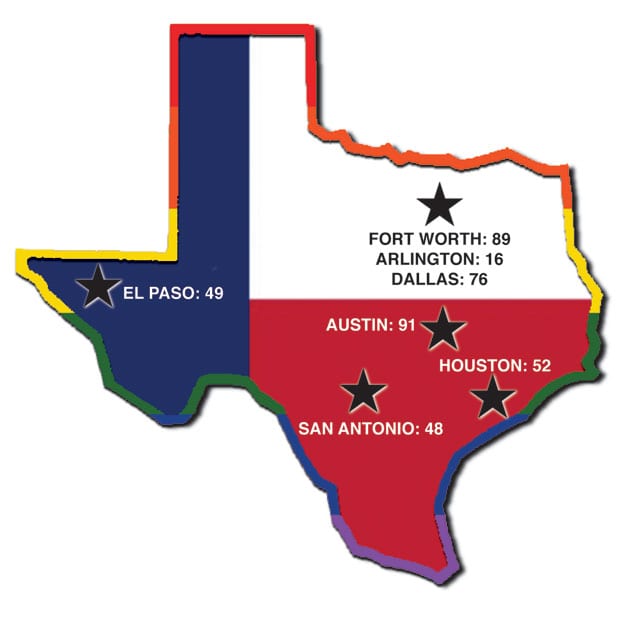Fort Worth tops Big D on Municipal Equality scorecard

GAY GRADES | HRC’s Municipal Equality Index ranks 137 cities nationwide, including seven in Texas, according to LGBT-related policies. Austin received the highest score in Texas, while Arlington received the lowest. (Kevin Thomas/Dallas Voice)
It’s widely believed that the city of Dallas — which has long had domestic partner benefits and a citywide nondiscrimination ordinance — has done virtually everything it can to support LGBT equality.
But a new national survey, released this week by the Human Rights Campaign, reveals some chinks in the city’s gay-friendly armor and shows that when it comes to LGBT equality, Fort Worth scores better than Dallas as a municipality.
Using a scale of 100 with 20 possible bonus points, HRC examined nondiscrimination laws, relationship recognition, employment practices, inclusiveness of city services, law enforcement and municipal leadership for its first Municipal Equality Index.
Austin scored the highest in Texas with 91 points. Fort Worth came in second with 89, and Dallas in third with 76. El Paso scored a 49, Houston a 52, San Antonio a 48 and Arlington a 16.
The study examined 137 cities of varying sizes, including all state capitals, the 50 most populous cities in the country, and the 25 large, 25 mid-size and 25 small municipalities with the highest proportion of same-sex couples.
The study also included cities with HRC steering committees. Several overlapped to bring the total to 137.
Cathryn Oakley, the primary author of the MEI, said that Texas was “a wonderful surprise” because the scores were so progressive in a state where there are no pro-LGBT state laws.
“Austin and Fort Worth did really well. There were not that many cities that scored that high,” she said. “Dallas, I think, did really well. A 76 is not only above average but coming from a state where there is no state support, it’s particularly notable that they did so well.”
Texas’ average score was 60, which is about the same as the national average. Out of the 137 cities, 11 scored a 100, 42 scored higher than Dallas, nine scored higher than Fort Worth and 120 scored higher than Arlington. One tied with Arlington and two had the same score as Dallas.
Oakley said the goal of the study was to see how cities are helping advance LGBT equality and identify areas where they can improve. She said HRC conducted research and sent the results to the cities for their input. Both Fort Worth and Dallas responded.
Dallas and Fort Worth lost points for not having comprehensive transgender health benefits and for not having some “soft benefits” like equivalent family leave or legal dependent benefits. Fort Worth also received more points in municipal services in programs because it has a Human Relations Commission and a City Manager’s Human Relations Unit, which Oakley said acts in the mayoral LGBT liaison capacity because it is separate from the commission. Dallas received credit for the LGBT liaison for Councilwoman Delia Jasso’s LGBT Task Force.
In the municipality’s relationship with the LGBT community category, Fort Worth received six out of eight points, compared to Dallas’ two points. Fort Worth also got all seven bonus points in the category when Dallas received five.
Oakley said that category was mainly subjective and she made scoring decisions based on how outspoken city officials were on behalf of LGBT causes, using Councilman Joel Burn’s 2010 “It Gets Better” speech at a council meeting as an example.
The category also took into consideration recent legislation. Fort Worth passed domestic partner benefits and added trans protections to its nondiscrimination ordinance in the last few years, whereas Dallas hasn’t had any recent legislation, she said.
“One of the things that this project does is it is a reality check and it’s saying you think that you’re amazing, and you are, but maybe you’re not quite as amazing as you could be,” Oakley said. “For Dallas, having a Human Rights Commission would be a big deal. …It’s clear that there are a lot of good intentions, but I think it would be great to have some of those intentions turned into actions.”
Cece Cox, CEO of Resource Center Dallas, said she was glad Dallas was ranked third in the state and was grateful for the outlined areas of improvement.
“I think that it identifies some areas that the city could take action on to improve its score. [Dallas] has a pretty decent score,” she said.
Cox said the city could improve by adding transgender inclusive and soft health benefits for complete workplace equality, along with city-provided services for LGBT elderly, homeless and youth.
Jon Nelson, Fairness Fort Worth president, said for any city to score above 70 is an accomplishment, adding that it’s hard to compare cities based on the scores.
He said Fort Worth needs to push for the city manager to add comprehensive transgender health coverage, which the City Council almost did in 2009.
Arlington’s score shocked Nelson because former FFW President Tom Anable reached out to the mayor and council members numerous times to work on pro-equality legislation. Arlington received points for nondiscrimination in city employment, reporting hate crimes to the FBI and one point for city leadership regarding LGBT equality.
“I think the only telling score of Texas cities that’s important is Arlington. It’s a shame because they don’t seem to care very much,” Nelson said. “It’s my hope that Arlington will wake up to the realization that cities which protect all of their citizens and all of their employees, including those with particular sexual orientations or gender identities, are in the forefront of what cities should be like.”
This article appeared in the Dallas Voice print edition November 30, 2012.

